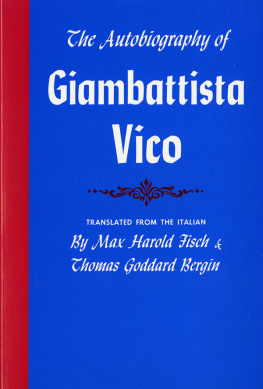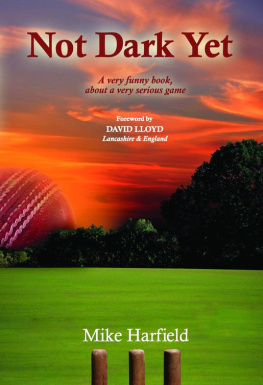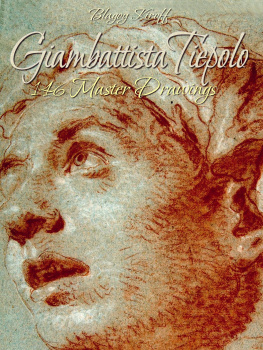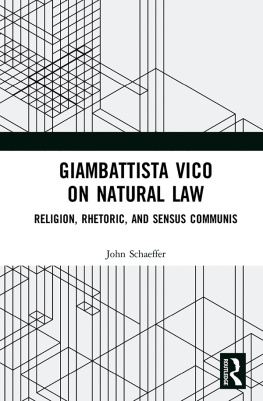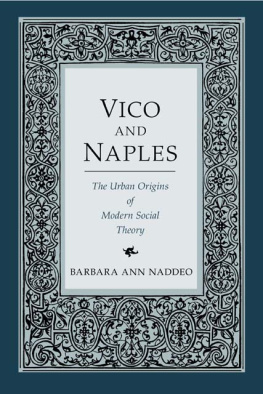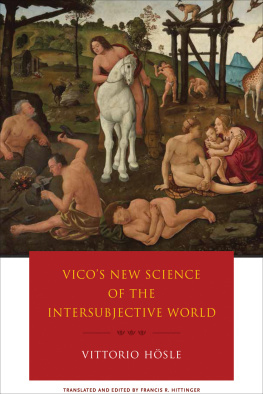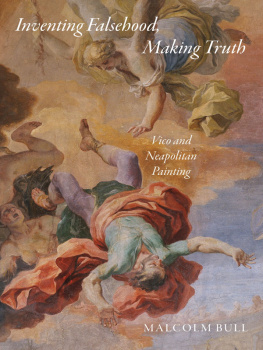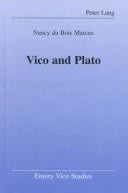Harfield - The Occasions of Community: Giambattista Vico and the Concept of Society
Here you can read online Harfield - The Occasions of Community: Giambattista Vico and the Concept of Society full text of the book (entire story) in english for free. Download pdf and epub, get meaning, cover and reviews about this ebook. year: 2017, publisher: Wipf & Stock Publishers, genre: Science. Description of the work, (preface) as well as reviews are available. Best literature library LitArk.com created for fans of good reading and offers a wide selection of genres:
Romance novel
Science fiction
Adventure
Detective
Science
History
Home and family
Prose
Art
Politics
Computer
Non-fiction
Religion
Business
Children
Humor
Choose a favorite category and find really read worthwhile books. Enjoy immersion in the world of imagination, feel the emotions of the characters or learn something new for yourself, make an fascinating discovery.

The Occasions of Community: Giambattista Vico and the Concept of Society: summary, description and annotation
We offer to read an annotation, description, summary or preface (depends on what the author of the book "The Occasions of Community: Giambattista Vico and the Concept of Society" wrote himself). If you haven't found the necessary information about the book — write in the comments, we will try to find it.
Harfield: author's other books
Who wrote The Occasions of Community: Giambattista Vico and the Concept of Society? Find out the surname, the name of the author of the book and a list of all author's works by series.
The Occasions of Community: Giambattista Vico and the Concept of Society — read online for free the complete book (whole text) full work
Below is the text of the book, divided by pages. System saving the place of the last page read, allows you to conveniently read the book "The Occasions of Community: Giambattista Vico and the Concept of Society" online for free, without having to search again every time where you left off. Put a bookmark, and you can go to the page where you finished reading at any time.
Font size:
Interval:
Bookmark:
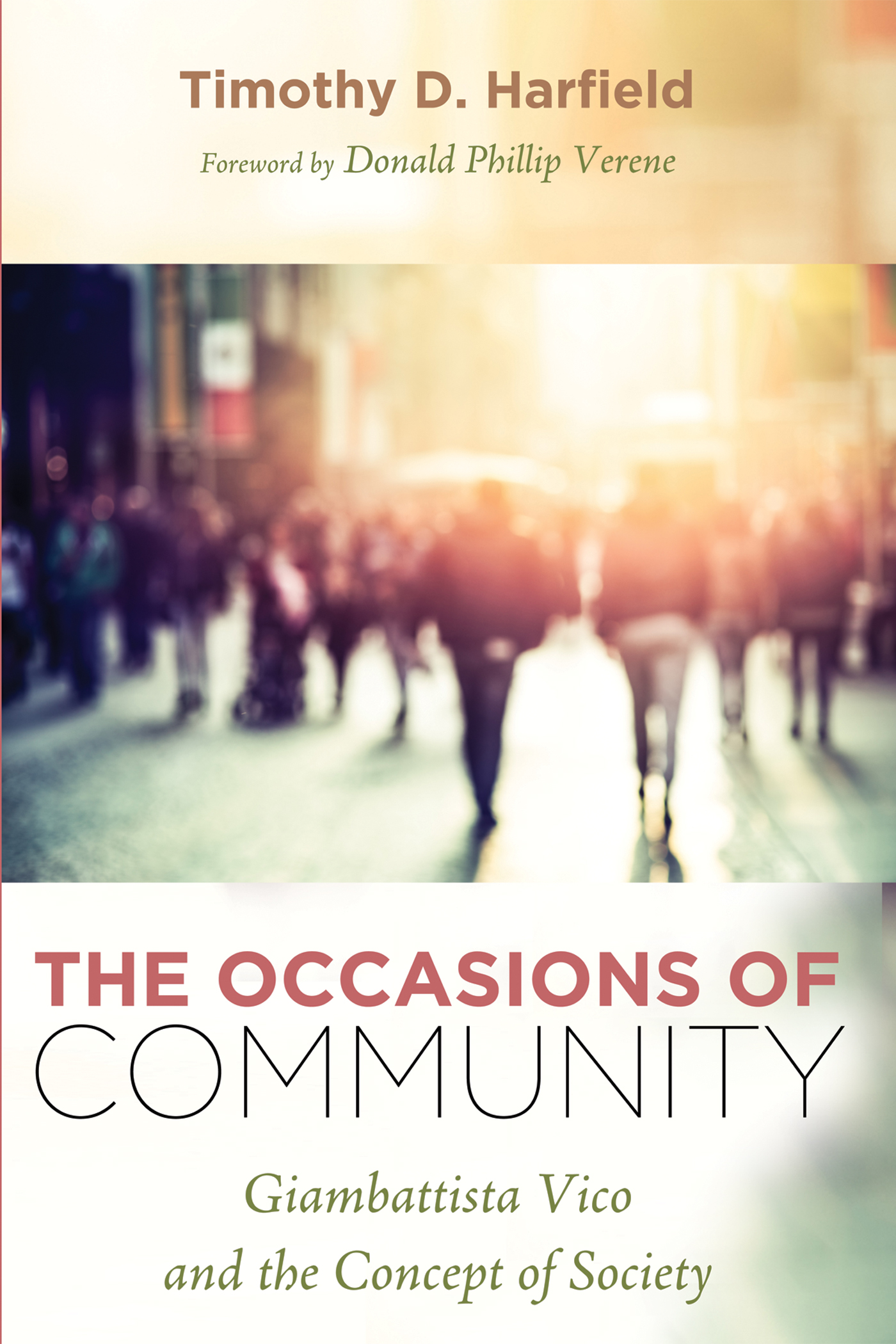
Giambattista Vico and the Concept of Society
Timothy D. Harfield
Foreword by Donald Phillip Verene

I t is a pleasure to add a voice of acclaim to Timothy Harfields views of community and society, especially as they originate from Vicos masterpiece, Principles of New Science concerning the Common Nature of the Nations . Vico, and Hegel after him, are the founders of the modern philosophy of history. Both teach us, in different ways, that anything human is properly understood only when we begin from its origin and elicit the necessary phases of its development. In the human world each thing lives a lifehas a beginning and an end.
Human society, for Vico, begins in poetic wisdom ( la sapienza poetica ), or what in contemporary terms would be called mythic thought, an age in which all events of nature and all forms of human activity are full of gods. This sense of the origin of human thought and society leads Cassirer, in the fourth volume of his Problem of Knowledge , to call Vico the real discoverer of the myth. As Vico says, in one of the axioms of his science, Doctrines must take their beginning from that of the matters of which they treat. In accordance with this axiom, Vico says that the first science to be learned should be mythology or the interpretation of fables.
Our understanding of human society must begin with a grasp of the rituals and myths in terms of which human beings first order the world. Vicos new science takes the ladder of human life a rung lower than Hegels science of the experience of consciousness that begins in his Phenomenology of Spirit with sense-certainty ( die sinnliche Gewissheit ), a stage in which the gods have already disappeared and consciousness has achieved the ability to apprehend its objects as pure sense-particulars.
To regard the human world as having a definite beginning is also to realize that any nation or society within the human world comes to a definite end. The life of any nation runs its course ( corso ). At the end of its course is not Hegels Absolute, unless we see Hegels Absolute as a vision of the presence of Providence in history. In another of his axioms, Vico says, Men first feel necessity, then look for utility, next attend to comfort, still later amuse themselves with pleasure, thence grow dissolute in luxury, and finally go mad and waste their substance. No society outlives history. All rise and fall within it. As Stephen says, in Joyces Ulysses , History is a nightmare from which I am trying to awake.
Societies, in Vicos view, fall apart because they lose their original power of imagination ( fantasia ) to keep in touch with the divine and because they fail to preserve the customs that make human beings truly human. As Rousseau puts it, in his Discourses , Finally, men chased the gods out in order to live in the temples themselves. Nations are consumed by the subtleties of malicious wits, and become scenes of the citizens following their own inclinations to pleasure and caprice, dissolving politics into ideologies and regarding laws not as instructions in civil wisdom but as obstacles to be circumvented on behalf of their own opinions and desires.
Vico says that in this state of society people are turned into beasts made more inhuman by the barbarism of reflection than the first men had been made by the barbarism of sense. The end of a nation is marked by the onset of a rational madness, by the minds eye seeing by lamplight rather than by the sun. Providentially, however, the end of a corso is also the condition for a new beginning, a ricorso , in which human society can attempt again to reach the state of a republica rule of the bestthat is eternally present as an ideal for those who can grasp it.
The bibliography of works on Vico in English fills a volume of more than two hundred pages. Those in Italian and other languages expand this list multiple times, not including Nicolinis early, two-volume Bibliografia Vichiana . Yet, in this large body of literature, little has been devoted to the concept of society that derives from Vico. It is our good fortune that Harfields important study allows us to begin to fill this gap.
Donald Phillip Verene
Charles Howard Candler Professor of Metaphysics and Moral Philosophy
Director of the Institute for Vico Studies
Emory University
A The Autobiography of Giambattista Vico . Translated by Max Harold Fisch and Thomas Goddard Bergin. Ithaca, NY: Cornell University Press, 1983 .
FNS The First New Science . Translated by Leon Pompa. Cambridge: Cambridge University Press, 2002 .
NS The New Science of Giambattista Vico . Translated by Thomas Goddard Bergin and Max Harold Fisch. Ithaca, NY: Cornell University Press, 1984 .
O IOVI On Humanistic Education (Six Inaugural Orations, 1699 1707 ) . Translated by Giorgio A. Pinton and Arthur W. Shippee. Ithaca, NY: Cornell University Press, 1993 .
SM On the Study Methods of Our Time . Translated by Elio Gianturco. Ithaca, N. Y.: Cornell University Press, 1990 .
AW On the Most Ancient Wisdom of the Italians . Translated by Jason Taylor. New Haven, CT: Yale University Press, 2010 .
UL A Translation from Latin into English of Giambattista Vicos Il Diritto Universale/Universal Law . Translated by John D. Schaeffer. Lewiston, NY: Edwin Mellen, .
HMOn the Heroic Mind. In Vico and Contemporary Thought , edited by Giorgio Tagliacozzo, Michael Mooney and Donald Phillip Verene, . Atlantic Heights, NJ: Humanities Press, 1979 .
Citations to FNS and NS are by paragraph enumeration used in the volumes above and introduced in the Laterza Edition of Vicos works, Opere di G. B. Vico , vols. in II (Bari: Laterza, 19111941 ).
Unless otherwise noted, all original Latin and Italian citations are taken from the Laterza edition of Vicos work.
A lthough the question of societys ontological status is as old as the discipline of sociology itself, it is at the center of a debate that has been reignited in recent years by Roy Bhaskar, Rom Harr, Michel Freitag, Niklas Luhmann, Bruno Latour, and others. Despite disagreement about the nature of society and the extent to which it is legitimate to talk about it as a real entity with features and effects that are separable from the individual actors that make it up, a fact about which each of these thinkers agree is that, as a modern concept, society was unthinkable until the middle of the eighteenth century.
In their 1751 Encyclopdie, Diderot and dAlembert insisted that the word social was newly introduced into language, to designate the qualities that render a man useful in society, proper to the commerce of men. Strictly speaking, Diderot and dAlembert were not correct. In French alone it is possible to trace the term back to at least the mid-fourteenth century. Erroneous though their observation may have been, as a sentiment it is nonetheless revealing of the fact that the late seventeenth century saw a small explosion in the use of terms related to society and social, followed in the eighteenth century by a steady increase in the use and discursive importance of a constellation of related terms.
For his 1994 book Citizens without Sovereignty: Equality and Sociability in French Thought , Daniel Gordon queried the ARTFL database of French language texts to produce a summary table of the occurrences of the terms socit(s), social(e)(es)(-aux), sociable(s), and sociabilit during the seventeenth and eighteenth centuries. Although not strictly representative, the table, also used by Keith Michael Baker, is very helpful in visualizing the suddenness and intensity with which the terms came into common use in French. Since 1994 , the ARTFL database has increased its collection of seventeenth-century works from to , and its collection of eighteenth-century works from to . It, therefore, seems appropriate to include an updated version of the table here:
Font size:
Interval:
Bookmark:
Similar books «The Occasions of Community: Giambattista Vico and the Concept of Society»
Look at similar books to The Occasions of Community: Giambattista Vico and the Concept of Society. We have selected literature similar in name and meaning in the hope of providing readers with more options to find new, interesting, not yet read works.
Discussion, reviews of the book The Occasions of Community: Giambattista Vico and the Concept of Society and just readers' own opinions. Leave your comments, write what you think about the work, its meaning or the main characters. Specify what exactly you liked and what you didn't like, and why you think so.

